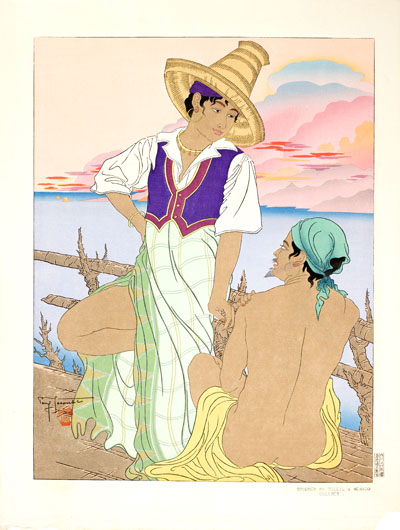The islands of the South Seas, including the Marianas, Carolines, Palaos and Marshall Islands, were all under Japanese mandate between 1919 and 1945. Jacoulet traveled to these islands regularly in the late 1920s and 1930s and, for a time, owned a home in Saipan in the Northern Mariana Islands.
He sketched the people of the Pacific Islands along with native birds, plants and insects, filling his notebooks and painting hundreds of watercolors based on his observations. These sketches and watercolors represent a combination of anthropological study, academic observation and artistic experimentation in line, composition and color. Throughout his career, Jacoulet returned to these source materials to produce new prints in collaboration with Japanese woodblock carvers and printers.
Jacoulet had a particular interest in the individuality of his subjects and the regional customs of the islanders. The examples on display here also demonstrate Jacoulet’s affinity for combining psychological portraits with detailed imagery of indigenous flora and fauna.
(Sunset in Menado. Celebes)
1938
Color woodcut print
Page size: 18 3/4 x 14 1/4in. (47.6 x 36.2 cm)
Image size: 11 3/4 x 15 1/2 in. (29.8 x 39.4 cm)
Gift of Eugene Finkin in memory of Dorothy Finkin
2012.9.3
© 2012 Artists Rights Society (ARS), New York / ADAGP, Paris
Although Jacoulet traveled to France and studied Western art, he considered Japanese artistic culture to be his principal influence. This evening scene set in the Pacific island of Celebes was inspired by the French painter Édouard Manet’s Luncheon on the Grass of 1863. In Jacoulet’s print, the male figure, rather than the female, appears nude and in a subservient role which is an intentional reversal of Manet’s composition.




